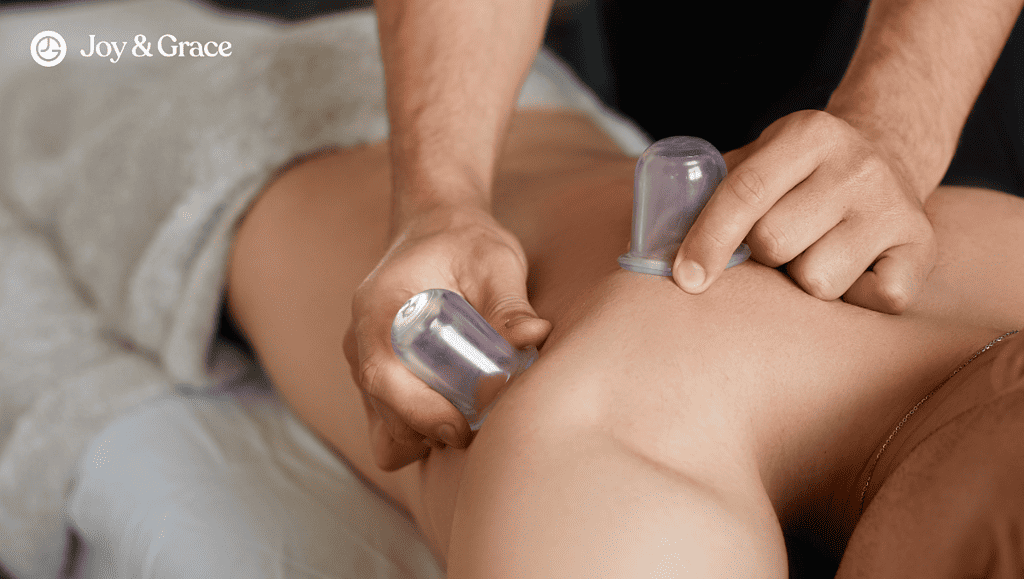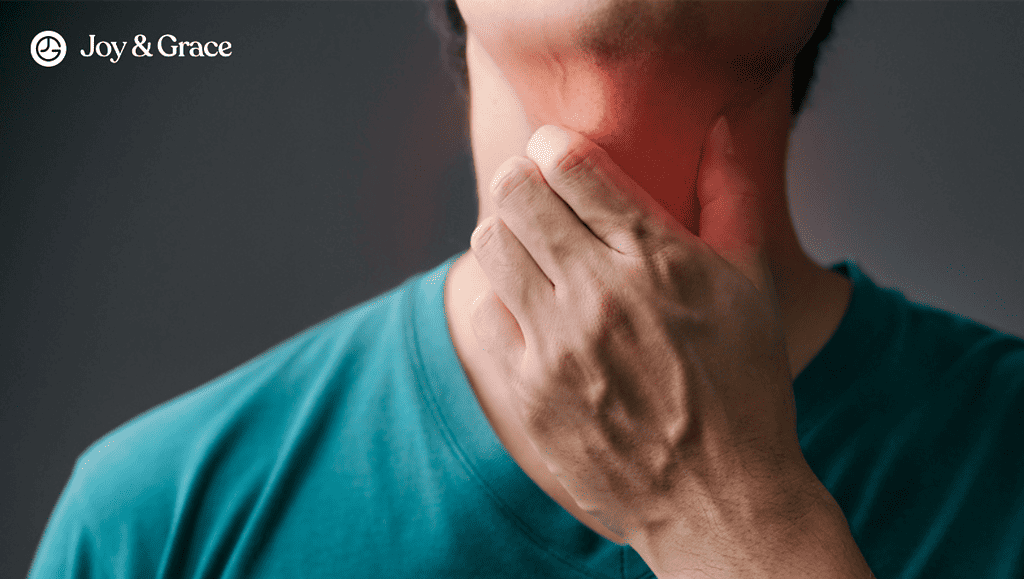Irritable Bowel Syndrome (IBS) is a complex condition that can cause various symptoms. The most common symptoms are abdominal pain, bloating, and diarrhea.
However, some IBS patients also experience pain in unexpected places, such as their shoulders. We will explore the possible reasons for this link between IBS and shoulder pain.
If you are an IBS patient experiencing shoulder pain, read on to learn more about what might be causing your symptoms and what you can do to find relief.
Can IBS Cause Back And Shoulder Pain?
Although IBS doesn’t directly hurt the shoulder, studies suggest that many people with IBS report feeling shoulder pain.
In a study with 356 IBS patients, more than half reported neck and shoulder problems.
Additionally, the World Gastroenterology Organization lists:
- Backache and other muscle and joint pains as an associated non-gastrointestinal symptom.
“Joint pains” can mean any kind of joint, shoulders included.
And also, based on that, we can answer the other question. As you can see, IBS does indeed cause back pain as well.
A paper by the University of North Carolina claims between 28% to 80% of IBS patients report back pain as one of their symptoms.
However, it's important to remember that not everyone with IBS will have back and/or shoulder pain. And on the other hand, not everyone with mild GI problems has IBS.
Last but not least, the pain might not even be the result of the condition.
So, it is always best to see a doctor for a proper diagnosis and treatment.
How IBS causes shoulder or back pain still needs further research. However, there are some theories.
Too Much Sensitivity To Pain
After going through the spine, information about body pain is sent along nerves to the brain.
That is done through gates that control how much of this information gets through. Our brains constantly send signals to these spinal gates, telling them to block signals too weak to be helpful.
Nobody wants to be constantly aware of all the minor pain from normal body movement. That is one way the brain limits the massive amount of information it gets from the millions of nerve sensors all over our bodies.
One popular theory in the field of IBS research is that IBS patients are more sensitive because they don't get enough "inhibition" of pain signals.
This could explain why headaches, shoulder and back pain, and muscle aches are common in these people.
People with bad inhibition might have more open pain gates, like the princess in "The Princess and the Pea," who could feel a pea through 20 mattresses.
Still, there needs to be direct data from people with IBS to show how accurate this view is.
Turning Emotional Discomfort Into Physical Expression
IBS patients tend to turn strong emotions into physical symptoms.
That could explain why they have a lot of symptoms and disorders that don't involve their GI tract.
Somatization is the Greek word for "body." So "to express in the body" literally means "somatization." Everyone "somatizes" to some degree. It is normal to:
- Feel butterflies in your stomach,
- Blush or turn pale, get a lump in your throat, or
- Feel your heart beating in your chest when you are very emotional.
People also often have shaky hands, a stiff neck, or too much sweat when stressed.
But some people are more likely than others to let negative emotions appear in their bodies. People often consider this an alternative, less healthy way to show or feel emotional pain.
Some people may do this a lot because they have a personality trait that makes them shy away from being expressive with other people.
For others, it could be because they grew up with strict, controlling, or abusive parents or caretakers who didn't let them show normal negative emotions. In these situations, getting a headache or stomachache may be another way to "speak up" about how you feel.
A study additionally confirmed that women with IBS tend to keep their negative thoughts and feelings to themselves.
Somatization may be caused by suppressing normal expressions of negative emotions, no matter the reason. Hence, there are signs that this might cause IBS, at least in some women with the disorder.
Can IBS Affect Other Parts Of The Body?
IBS happens more often than expected with other medical conditions that don't seem to have much to do with the gut.
IBS patients report a variety of symptoms that are not related to the gastrointestinal system.
- Fibromyalgia:
Most research has been done on people with IBS and fibromyalgia, a disorder that causes widespread muscle pain. Fibromyalgia affects about 2% of the general population but 26–65% of IBS patients.
When this overlap is looked at from the other side, the same results are found: 32–77% of fibromyalgia patients have IBS.
- Chronic Fatigue Syndrome:
Chronic fatigue syndrome (CFS) is another medical condition that has been found to occur with IBS much more often than expected.
It is thought that only 0.4% of the general population has CFS, but 14-54% of IBS patients have been found to have it. On the other hand, 35–92% of people with chronic fatigue syndrome also have IBS. - Other conditions:
Other symptoms and conditions of people with IBS include
- Chronic back pain (29–37.3% of patients)
- Chronic headaches (34–72% of patients)
- Chronic pelvic pain (35–49.9% of patients)
- Sexual function disturbances (24–83% of patients)
- Sleeping disturbances (37.6% of patients)
- Incomplete bladder emptying (50% of patients)
- Urinary urgency (60% of patients)
Overall, it's clear that IBS is a complicated condition that can affect a lot of different parts of a person's life.
We strongly advise getting the proper medical care and working with your doctors. This way, you can find the best treatment plan for your needs and symptoms.
When Should I Worry About IBS Pain?

If your abdominal pain is getting worse and worse all the time, you may need to see a healthcare provider.
That’s because progressive abdominal pain is considered an “alarm feature” in patients with IBS.
Alarm features are symptoms that are thought to be linked to another, potentially more severe, bowel disease.
Other additional “alarm” features include:
- When the doctors find a palpable abdominal or rectal mass on examination,
- Doctors finding increased lymph nodes around the colon,
- Having elevated “inflammatory markers” (in blood analysis),
- Having rectal bleeding, and
- Unexplained weight loss.
Having any of these symptoms doesn’t automatically mean there’s severe disease present.
However, there is still an increased chance. Additional tests and evaluations are definitely necessary.
What Can People With IBS Do To Feel Better?

With some simple steps, you could potentially ease your IBS symptoms.
A general improvement of IBS symptoms means you could also alleviate your shoulder or back pain.
Here’s a quick list that doctors also recommend:
- Start a diary to write down what you ate, what you did, and how you felt each day
This way, you can figure out if something you do or eat makes your symptoms better or worse.
- Stop eating foods that could be making your IBS worse
First, stop eating foods that give you gas. Then, for two weeks, stop eating milk, ice cream, and other foods that have traces of milk.
- If you have constipation, eat more fiber
To do this, you should eat more fruits and vegetables. Or you can take pills or powders that contain fiber. (Cut back on fiber if symptoms worsen when you eat more fiber.)
- Exercise
Do something active for 20 minutes to an hour three to five times a week. Studies have shown that this helps ease the symptoms of IBS.
There are also many medicines used to treat the symptoms of IBS.
But unfortunately, these medicines do not cure the disease. Most of the time, they are used to ease symptoms. Which one you choose depends partly on whether your main problem is diarrhea, constipation, or pain.
As a general rule, medications are only given to people whose symptoms don't improve with less invasive treatments. These treatments include changing your diet or taking fiber supplements (as we mentioned above).
If you do need medicine, your doctor should work with you to figure out the best way to help you.
Takeaway
To sum everything up:
- Many people with Irritable Bowel Syndrome (IBS) report feeling shoulder pain, but the cause is not yet well known.
- Some studies show that people with IBS might be more sensitive to pain, which could explain why shoulder and back pain are common symptoms.
- Another theory is that IBS patients may “somatize” strong emotions, which could also contribute to the pain.
- Additionally, IBS is more common in people with fibromyalgia and chronic fatigue syndrome. These conditions could further worsen the shoulder and back pain.
- Things like starting a meal diary, exercising, eating more fiber, and not eating foods that trigger your IBS can go a long way. In addition to helping with bowel problems, they might also help with your shoulder or back pain.















